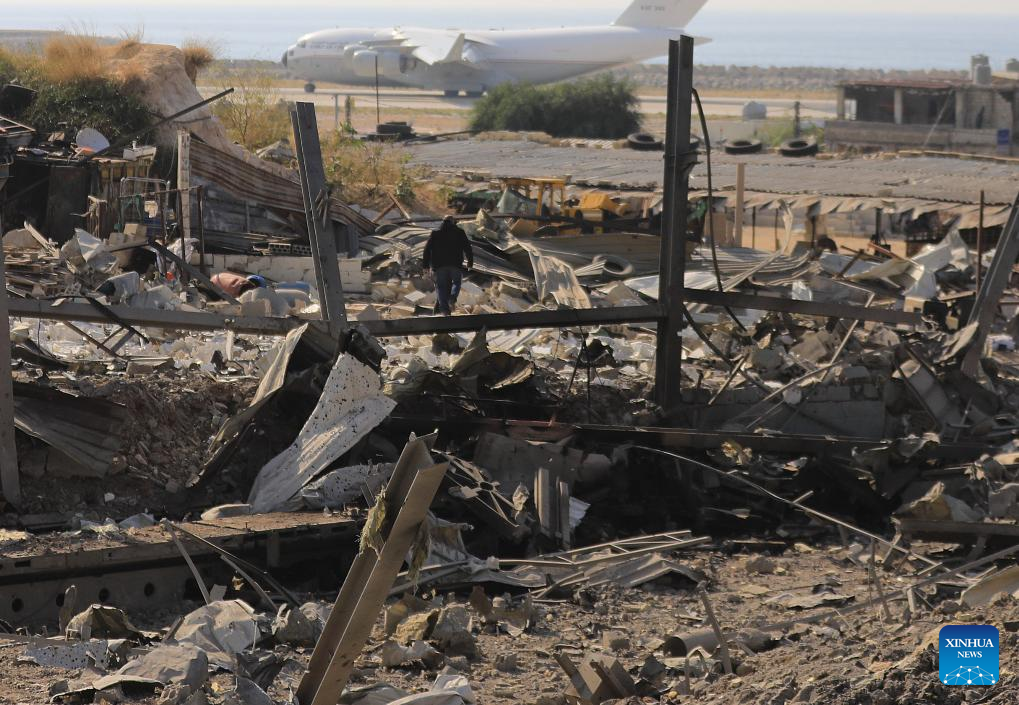
This photo shows the damage caused by Israeli airstrikes in Ouzai, adjacent to Rafik Hariri International Airport in Beirut, Lebanon, on Nov. 7, 2024. Israeli warplanes renewed at dawn on Thursday their raids on Beirut's southern suburbs, including Ouzai, a densely populated area near the Beirut airport, local TV channel al-Jadeed reported. (Xinhua/Bilal Jawich)
BEIRUT/JERUSALEM, Nov. 7 (Xinhua) -- Israeli warplanes renewed at dawn on Thursday their raids on Beirut's southern suburbs, including Ouzai, a densely populated area near the Beirut airport, local TV channel al-Jadeed reported.
According to al-Jadeed, the strikes damaged the area surrounding Runway 17 and some departments outside the airport's main entrance, while the main hall was not affected.
On Thursday morning, Lebanese Public Works and Transport Minister Ali Hamieh confirmed on social media platform X that the airport was functioning normally.
Meanwhile, the official National News Agency reported three raids in the Ouzai area, along with heavy airstrikes targeting the Hezbollah-affiliated Al-Manar TV building in Haret Hreik municipality, as well as Haret Baajour and Tahwitat al-Ghadir regions.
The raids followed evacuation warnings from the Israeli army, urging residents in areas including Ouzai, Haret Hreik, Hadath, and Tahwitat al-Ghadir in Beirut's southern suburbs to leave.
Local media reported that the raids involved heavy missiles, with explosions echoing across Beirut and Mount Lebanon regions. Three missiles reportedly fell near Runway 17 at Rafic Hariri Airport, and a gas station in Tahwitat al-Ghadir was bombed, sparking a massive fire.
Also on Thursday, the Israeli military said in a statement that it struck Beirut in a night attack that targeted Hezbollah's command centers and other infrastructure.
On the same day, Lebanese parliament members sent a letter to UNESCO Director-General Audrey Azoulay, urging the protection of Lebanon's cultural and historical heritage from Israeli attacks.
"We have to draw your attention to an urgent necessity -- the protection of historical sites in Lebanon, especially in Baalbek, Tyre, Sidon, and other precious monuments that are facing great danger as a result of the escalation of atrocities by Israeli forces," said the parliamentarians.
On Wednesday, Israeli forces targeted residential neighborhoods in Baalbek and the historic "Al-Manshiya" building, which was completely destroyed, according to Baalbek Mayor Mustafa al-Shal.
To avoid the negative impact of Israeli strikes on Lebanon's cultural and historical heritage, a UNESCO official told Xinhua that the agency had contacted all state parties concerned, reminding them of their commitments to treaties pledging not to harm cultural heritage amid armed conflict, namely the 1954 Hague Convention for the Protection of Cultural Property in the Event of Armed Conflict and the 1972 Convention concerning the Protection of the World Cultural and Natural Heritage.
The official also noted that an extraordinary session of the Committee for the Protection of Cultural Property in the Event of Armed Conflict will be organized on Nov. 18, with the aim of enhancing protection and international assistance for Lebanese cultural properties.
Since Sept. 23, the Israeli army has been conducting an intensive air attack on Lebanon in a dangerous escalation with Hezbollah.
The ongoing clashes between Israel and Hezbollah began on Oct. 8, 2023, when Hezbollah fired rockets into Israel in support of Hamas in the Gaza Strip, prompting retaliatory fire and airstrikes by Israel in southeastern Lebanon.
According to the Lebanese Health Ministry, the death toll from Israeli airstrikes on Lebanon has exceeded 3,000, with injuries surpassing 13,600. ■



